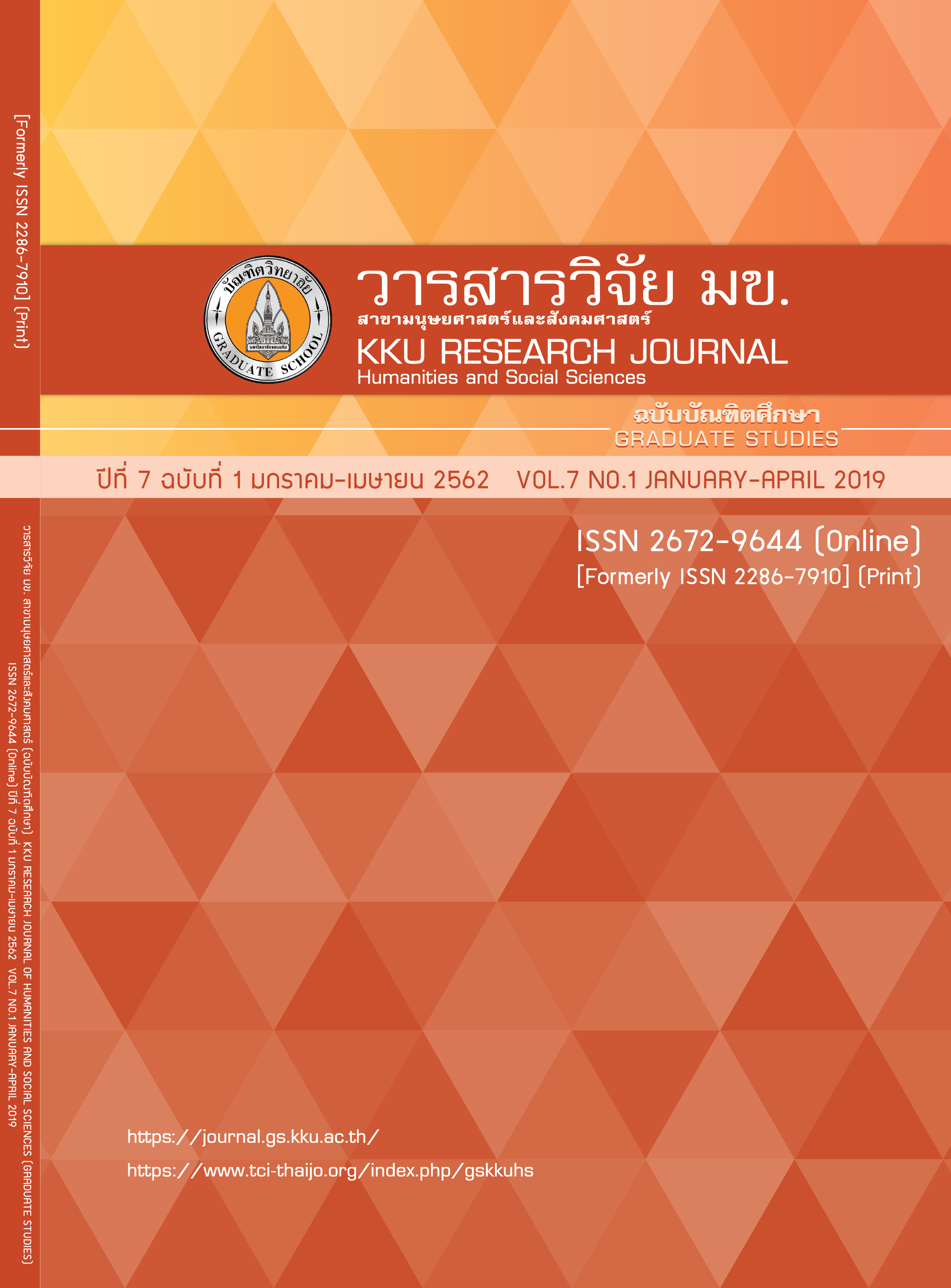ความแตกต่างของพฤติกรรมการรับสื่ออิเล็กทรอนิกส์และการรับรู้การท่องเที่ยวของประชากรรุ่นวายที่มีภูมิลำเนาและรายได้ครอบครัวแตกต่างกัน
คำสำคัญ:
พฤติกรรมการรับสื่ออิเล็กทรอนิกส์, การรับรู้การท่องเที่ยว, ประชากรรุ่นวายบทคัดย่อ
การวิจัยเรื่องนี้มีวัตถุประสงค์เพื่อ (1) ศึกษาระดับพฤติกรรมการรับสื่ออิเล็กทรอนิกส์และการรับรู้การท่องเที่ยวของประชากรรุ่นวาย และ (2) เพื่อศึกษาความแตกต่างของตัวแปรทั้งสองระหว่างกลุ่มประชากรรุ่นวายที่มีภูมิลำเนาและรายได้ครอบครัวแตกต่างกัน ตัวอย่างการวิจัยคือนักศึกษาชั้นปีที่ 3 และ 4 จากสถาบันอุดมศึกษาจำนวนรวม 510 คน เลือกแบบหลายขั้นตอน เครื่องมือวิจัยเป็นแบบสอบถามแบบเลือกตอบและมาตรประเมินค่า วิเคราะห์ข้อมูลด้วยสถิติบรรยาย และ การวิเคราะห์ความแปรปรวนตัวแปรพหุนามแบบสองทาง ผลการวิจัยที่สำคัญพบว่า (1) พฤติกรรมการรับสื่ออิเล็กทรอนิกส์และการรับรู้การท่องเที่ยวของประชากรรุ่นวายโดยรวมอยู่ในระดับสูง (2) ประชากรรุ่นวายที่มีรายได้ครอบครัวแตกต่างกันมีพฤติกรรมการรับสื่ออิเล็กทรอนิกส์และการรับรู้การท่องเที่ยวแตกต่างกันอย่างมีนัยสำคัญทางสถิติที่ระดับ .01 แต่ภูมิลำเนาต่างกันมีตัวแปรทั้งสองแตกต่างกันอย่างไม่มีนัยสำคัญทางสถิติ
เอกสารอ้างอิง
2. Wanthanom C. Tourism Industry. Bangkok: Virat Education; 2009. Thai.
3. National Statistical Office. The survey of Thai travelling behavior 2016. Bangkok: National Statistical Office; 2016.
4. Boonmasungsong D, Pornpakdee S, Nunnad P. Factors influencing the willingness to retouring, Amphur Wangnamkheo, Nakonratchasima Province [Research report]. Rajamangala University of Technology Isan, Nakonratchasima Province; 2014. Thai.
5. Siam Commercial Bank [Internet]. 2014. Strategic mindset of Gen Y. Retrieved August, 2015 from https://www.scbeic.com/th/detail/file/product/130/dzi68owq5l/8372
_20141112161337.pdf. Thai.
6. Benckendorff P, Moscardo G, Pendergast D. (eds). Tourism and generation Y. Oxford: CABI; 2010.
7. Lamaicheen K [Internet]. 2009. Eco-tourism culture. Retrieved August, 2016, from https://www.human.ubru.ac.th/2010/images/educationdocument/aj.kulawadee/บทที่%201%20องค์ประกอบของการท่องเที่ยว%20(2552).pdf. Thai.
8. Damchoo P, Fakthong D, Sonsawan B, Sonhwang P, Jitraree O. Motivations for sharing experiences through social media of flashpacker in hostels in Thailand. BEC Journal of Naresuan University. 2017; 12(1): 89-106. Thai.
9. Duggan M [Internet]. 2015. The demographics of social media users: Mobile messaging and social media 2015. Retrieved June, 2018, from www.pewinternet.org/2015/.../mobile-messaging-and-social-media-.
10. Denchai K. The influence of social media behavior and awareness of online information on the tourist’s selection of destination and accommodation in Pattaya [MA thesis]. Bangkok University; 2015. Thai.
11. Khorpornprasert B. The behavior and impacts of using Facebook of university students in Bangkok. Romphruek Journal. 2014; 32(2): 2-24. Thai.
12. Sittanont K, Prajaknet P. Thai tourists’ lifestyle, online media use and purchasing intention of tourism products and services. Journal of Communication and Management NIDA. 2016; 2(1): 1-17. Thai.
13. Sonchit W, Donkwa K. Online purchase intention of goods or service through smartphone. NRRU Community Research Journal. 2016; 10(1): 45-52. Thai.
14. Vongsingthong S. Information dissemination behavior in online social networks of teenagers. Romphruek Journal. 2016; 34(2): 12-31. Thai.
15. Law R, Buhalis D, Cobanoglu C. Progress on information and communication technologies in hospitality and tourism. International Journal of Contemporary Hospitality Management. 2014; 26(5), 727-750.
16. Munar AM, Jacobsen JKS. Motivations for sharing tourism experiences through social media. Tourism management. 2014; 43: 46-54.
17. Kemapatapan S. Media expose and Thailand’s tourism image perception of Chinese tourists. [MA thesis]. Thammasat University; 2015. Thai.
18. Choolamad K. Internet-using behavior and satisfaction towards the use of internet for travelling purpose of the tourists in Amphor Koh Phangan, Surat Thani Province. [MA thesis]. Dhurakij Pundit University; 2015. Thai.
19. Office of the Higher Education Commission [Internet]. 2016. Educational Statistics. Retrieved June, 2018, from https://www.info.mua.go.th/information/show_all_statdata_table.php?data_show=2. Thai.
20. Cohen J. Statistical power analysis for the behavioral sciences (2nd eds). Hillsdale, NJ: Lawrence Earlbaum Associates; 1988.
21. Faul F, Erdfelder E, Buchner A, Lang AG. Statistical power analyses using G* Power 3.1: Tests for correlation and regression analyses. Behavior Research Methods. 2009; 41(4): 1149-1160.
22. Parasakul L. Tourist behavior. Bangkok: Chulalongkorn University; 2013. Thai.
23. Rewtrakunphaiboon W. Consumer behavior in tourism. Pathumthani: Bangkok University; 2014. Thai.




